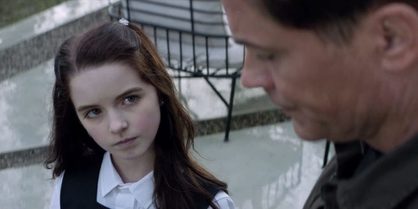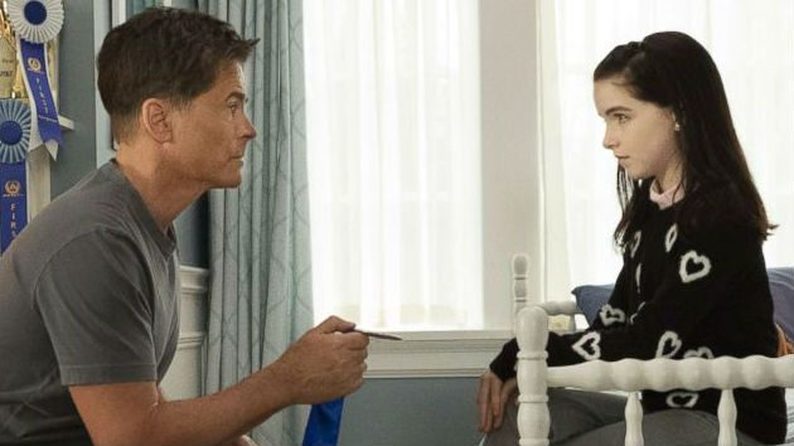 (By Mark Gonzales): When it was released in 1956, The Bad Seed became an instant classic that gathered four Oscar nominations. The film is about a pre-teen girl who kills without remorse or feeling and a parent who does not know how to best protect their dangerous child. Directed by Rob Lowe (St. Elmo's Fire), the 2018 Lifetime film The Bad Seed remake covers much of the same ground as the original while asking the question, "What if the killer's parent was played by Rob Lowe, and, also, what if everybody wanted to do him?"... ...This film marks the feature length directorial debut for Lowe and I must say, he does a pretty good job. The film is well cast, competently (if not imaginatively) shot, and it is mostly well written by Barbara Marshall (Wish Upon). The problems with the film come from structural issues, unclear themes, and a self-indulgent subplot. When the film begins, we see pre-teen Emma played by McKenna Grace (I, Tonya and next year's Captain Marvel) as she prepares for school. Grace's performance in this opening scene and, really, throughout the whole film is spot on. She's exacting, an overachiever, and when she sees a dead cat in her home's fountain, Emma does not bat an eye. We are excited to watch a movie about this character and see where she goes from here. Her intentions are made clear when she tells her father (Lowe) that she fully intends to win the Citizenship Award at her posh, private elementary school. Not long after this, Emma's aunt, played by the captivating Cara Buono (Stranger Things and Mad Men), states that she has found a nanny for young Emma. Emma doesn't like nannies, nor does she like needing them when her widower father is on dates. So, in this perfectly constructed scene we see what Emma likes (acclaim), doesn't like (nannies and PYTs dating her father), and what she is utterly indifferent to (death). If only every scene in the movie was as tight and focused as this initial scene. We are next treated to a series of scenes where Emma does the right thing when people are watching and does the wrong thing when they aren't. All of these scenes work together to show us that Emma is duplicitous and, I suppose, undeserving of the Citizenship Award that she so mightily covets. When Emma discovers that her classmate Milo has received the award, she compulsively taps her foot. Do you hear that tapping Milo? That is the sound of time running out on your ass. Milo accepts the award and we all have a good idea of what will become of him. This is where things begin to come apart thematically. Emma is driven and ambitious and when we learn that she does not win the Citizenship Award, we cannot help but to feel sorry for her. Milo is polite but does not exemplify the good citizenship standards of faith, honesty, grace, and compassion that Emma appears to. Granted, Emma is displaying these attributes with the intention of getting an award, but the educators at her school don't know this. So we are faced with an ethical dilemma. Is it wrong that Emma wants to win this award? Is it wrong that Emma alters her behavior to win this award? Is the purpose of giving a Citizenship Award not to inspire children to be better than they are? Can you stand me to ask two more rhetorical questions? What the hell did Milo do to deserve this award? Emma's loss kicks off the rest of the movie and while her response is not justified, it does seem as though she were robbed. Milo is a likable, white male while Emma is an ambitious, strong female. A scene with the teacher responsible for Emma's loss tells us that the teachers consider Emma to be wonderful but that she seems to exist in a world that is very different from our own. Is that a world where women with ambition are rewarded? It must be because we're not seeing any of that at this school. These initial scenes lay out what we can expect from the rest of the movie. Throughout the film, Emma will find herself faced with problems that have other, less murdery solutions but since she does not consider death to be a very big deal, she goes with that most permanent of resolutions. The film attempts to walk the line of showing Emma to be a tragic character while also inspiring fear of this child. While the film does a great job of making us feel compassion for Emma, it is less successful when it comes to making us afraid of her. Much of the tension and horror in this film comes from predictable deaths (maybe people should store those flammable liquids in a cabinet and not out in the open) and cliché jump scares (you'll never guess what is going to happen when that refrigerator door is closed…) While Emma's story is well thought out and purposefully performed, it is in the scenes with Emma's father that the film begins to fall apart. It would be easier to forgive this imbalance if not for the fact that the relationship between Emma and her father comprises at least half of the film's run time. By casting himself in the roll of Emma's concerned father Lowe demands that the audience see the film through this character's eyes. For the first half of the film, this works as we only need to understand that Emma's father loves her. In the second half, when we are supposed to believe that Lowe's character is scared of his child, Lowe's performance simply does not give us the sense of fear that the film requires. Scenes with Lowe that lack Emma are very disappointing and at times completely distracting. I am writing specifically about scenes with Lowe and Emma's young nanny, Chloe (Supernatural's Sara Dugdale). From the moment we meet Chloe, she is absolutely eye fucking Lowe. Chloe's character could have been an interesting and sympathetic ally to Lowe's character but she instead becomes a confusing character with only one goal in mind--getting some of that DILF (her words, not mine). As the film progresses and Chloe becomes increasingly overt in her advances, the film's focus shifts away from the killer child story and towards the story of how Rob Lowe is surrounded by deceitful women who want to possess him. A final issue with this film that may be entirely out of the hands of the filmmakers is that the commercial breaks come at very strange points. We come back from ads for detergent and find ourselves in the middle of scenes that appeared to be over. It is possible that the teleplay was originally written as a screenplay and poorly adapted or that Lifetime simply put the commercial breaks where they needed them without consideration for how it would alter the viewing experience. Either way, it's confusing, even for a TV movie. I really wanted to enjoy this movie. The subject matter is compelling, the performances are mostly good, and the conflict is engaging. With a different director, or possibly, the same director and a different leading man, this film could have been delightfully enjoyable and possibly even have recaptured some of the terror of the original. As it is, the film lacks the tension or even the WTF factor of a strange TV Movie. The film is a disappointment for the most part and a 3rd act that drags spoils a lot of great potential. I hope to see Lowe direct again, but we should all hope he does not cast himself in the lead next time. By Mark Gonzales
3 Comments
9/22/2018 07:17:40 am
A truely excellent review!!
Reply
Had NO idea a remake of this was made and that Lifetime decided to air it. I joke with my mother that everything on that channel is women killing men or running from a man that wants to kill them so it makes some sense. That little girl doesn't have that same look the one in the original had that made me want something bad to happen to her. She does have evil eyebrows though...
Reply
stan
5/1/2021 11:40:56 pm
If she doesn't get fried by a lightening bolt by the end of the movie then it's not a good remake.
Reply
Leave a Reply. |
Archives
March 2023
|


 RSS Feed
RSS Feed